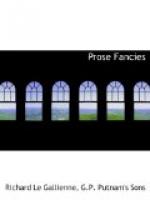But I am not going to weary you by indulging in the stale old diatribes against the publisher. For, to speak seriously the honest truth, I think they are in the main a very much abused race. Thackeray put the matter with a good deal of common-sense, in that scene in Pendennis where Pen and Warrington walk home together from the Fleet prison, after hearing Captain Shandon read that brilliant prospectus of the Pall Mall Gazette, which he had written for bookseller Bungay, and for which that gentleman disbursed him a L5 note on the spot. Pen, you will remember, was full of the oppressions of genius, of Apollo being tied down to such an Admetus as Bungay. Warrington, however, took a maturer view of the matter.
‘A fiddlestick about men of genius!’ he exclaimed, ’I deny that there are so many geniuses as people who whimper about the fate of men of letters assert there are. There are thousands of clever fellows in the world who could, if they would, turn verses, write articles, read books, and deliver a judgment upon them; the talk of professional critics and writers is not a whit more brilliant, or profound, or amusing than that of any other society of educated people. If a lawyer, or a soldier, or a parson outruns his income, and does not pay his bills, he must go to gaol; and an author must go too. If an author fuddles himself, I don’t know why he should be let off a headache the next morning—if he orders a coat from the tailor’s, why he shouldn’t pay for it....’
Dr. Johnson, who had no great reason to be prejudiced in their favour, defined booksellers as ‘the patrons of literature,’ and M. Anatole France has recently said that ’a great publisher is a kind of Minister for belles-lettres.’ Such definitions are, doubtless, prophecies of the ideal rather than descriptions of the actual. Yet, fairly dealt with, the history of publishing would show a much nearer living up to them on the part of publishers than the poets and their sentimental sympathisers are inclined to admit. We hear a great deal of Milton getting L10 for Paradise Lost, and the Tonsons riding in their carriage, but seldom of Cottle adventuring thirty guineas on Coleridge’s early poems, or the Jacksons giving untried boys L10—or, according to some accounts, L20—for Poems by Two Brothers.
To open the case for the bookseller or the publisher. The poet, to start with, bases his familiar complaints on a wilful disregard of the relation which poetry bears to average humanity. You often hear him express indignant surprise that the sale of butcher’s meat should be a more lucrative business than the sale of poetry. But, surely, to argue thus is to manifest a most absurd misapprehension of the facts of life. Wordsworth says that ‘we live by admiration, joy, and love.’ So doubtless we do: but we live far more by butcher’s meat and Burton ale. Poetry is but a preparation of opium distilled by a minority for a minority.




